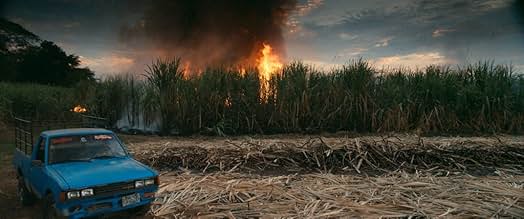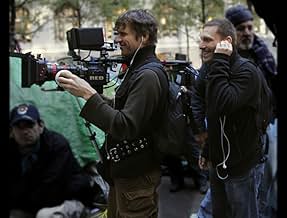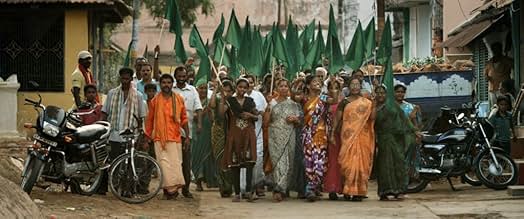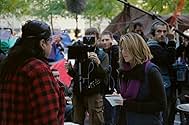A look at seven communities around the world with the proposition that we can seize the crisis of climate change to transform our failed economic system into something radically better.A look at seven communities around the world with the proposition that we can seize the crisis of climate change to transform our failed economic system into something radically better.A look at seven communities around the world with the proposition that we can seize the crisis of climate change to transform our failed economic system into something radically better.
- Director
- Writer
- Stars
- Awards
- 2 wins & 4 nominations total
- Director
- Writer
- All cast & crew
- Production, box office & more at IMDbPro
Storyline
Did you know
- TriviaThis marks Seth MacFarlane's first documentary film.
- Quotes
Herself - Narrator: Could it be that we are not the masters, after all? That we are just guests here on Earth, and that we can get evicted for bad behavior?
Featured review
I've always looked with some respect to Naomi Klein, although I've never read more than a couple of chapters here and there from her books. Given we don't really share a lot of political views (me not being a socialist nor fiercely anti-capitalism) I was looking forward to her take on this subject where I thought we'd have more common ground.
The first 5 minutes or so of this movie really got my hopes up. Klein's smooth narrator voice explained how she doesn't really like environmental movies (me neither!), how seeing ice bears looking for ice doesn't really do it for her (a movie that criticizes some clichés, neat!) and in a crescendo she boldly proposes that everything we've thought to be the cause of the climate change is wrong!
Then the actual movie begins and Klein's big twist turns out to be: capitalism is to blame. So not really a twist at all. And then we go on to learn... absolutely nothing new. The movie is entirely based on socialism vs. capitalism, which leaves little to no room for discussing facts or any deeper insights. Not a single scientist or researcher is interviewed.
Instead a rather uninteresting conflict between a Canadian Native American tribe and the local authorities is given a large amount of time. I say uninteresting because the only part of the conflict we get to see are some awkward telephone conversations and a short conversation at a parking lot. To make it worse Klein introduces the tribe as THE alternative to the evil capitalism and the modern society. They know how to respect the earth and take care of it (hello biggest cliché ever....) and so on. Then the next shot shows one of them driving her enormous truck, which I presume is not run on solar power. A similar scene takes place in Greece where some environmentalists sit in a forest pouring some liquid or another from an old Coca-Cola (plastic) bottle from their (plastic) cups.
Now don't get me wrong. I agree with Klein that marginalized people do suffer more. And I'm sure the Native American tribes and other activists shown are very much concerned with the environment. But by not addressing the discrepancy between how many people wish to save the environment and yet want to maintain a modern lifestyle (which includes cars and other modern consumption items), the movie leaves a gaping hole in the narrative of why the world looks like it does.
All this focus on the little man (activists) versus capitalism also leaves very little room for examination of how societies should change. The movie goes to Germany as it's one and only role model for change, where, according to Klein, everything is now just perfect since they stopped using nuclear power (?!) (and now relies on sun and wind power. Firstly nuclear power has literally no carbon emissions, and is also a thousand times more efficient than wind or solar power. Secondly these alternative sources may supply 30% of all Germany's needs on the best of days, but the rest of the time Germany has to compensate with good old coal, which as seen previously in the movie, shouldn't really be something to keep around as a good energy source.
Lastly I believe the thesis that environmental destruction began with the industrial revolution is severely dishonest. That is to deny all the iron mines, all the 'deforestification' and desertification (caused by agriculture), all the specie extinction etc that have previously existed due to human activities. For anyone interested in a less superficial understanding of the subject I'd recommend Jared Diamond's book "Collapse", in which he explains how different societies throughout histories have dealt with environmental destruction.
The first 5 minutes or so of this movie really got my hopes up. Klein's smooth narrator voice explained how she doesn't really like environmental movies (me neither!), how seeing ice bears looking for ice doesn't really do it for her (a movie that criticizes some clichés, neat!) and in a crescendo she boldly proposes that everything we've thought to be the cause of the climate change is wrong!
Then the actual movie begins and Klein's big twist turns out to be: capitalism is to blame. So not really a twist at all. And then we go on to learn... absolutely nothing new. The movie is entirely based on socialism vs. capitalism, which leaves little to no room for discussing facts or any deeper insights. Not a single scientist or researcher is interviewed.
Instead a rather uninteresting conflict between a Canadian Native American tribe and the local authorities is given a large amount of time. I say uninteresting because the only part of the conflict we get to see are some awkward telephone conversations and a short conversation at a parking lot. To make it worse Klein introduces the tribe as THE alternative to the evil capitalism and the modern society. They know how to respect the earth and take care of it (hello biggest cliché ever....) and so on. Then the next shot shows one of them driving her enormous truck, which I presume is not run on solar power. A similar scene takes place in Greece where some environmentalists sit in a forest pouring some liquid or another from an old Coca-Cola (plastic) bottle from their (plastic) cups.
Now don't get me wrong. I agree with Klein that marginalized people do suffer more. And I'm sure the Native American tribes and other activists shown are very much concerned with the environment. But by not addressing the discrepancy between how many people wish to save the environment and yet want to maintain a modern lifestyle (which includes cars and other modern consumption items), the movie leaves a gaping hole in the narrative of why the world looks like it does.
All this focus on the little man (activists) versus capitalism also leaves very little room for examination of how societies should change. The movie goes to Germany as it's one and only role model for change, where, according to Klein, everything is now just perfect since they stopped using nuclear power (?!) (and now relies on sun and wind power. Firstly nuclear power has literally no carbon emissions, and is also a thousand times more efficient than wind or solar power. Secondly these alternative sources may supply 30% of all Germany's needs on the best of days, but the rest of the time Germany has to compensate with good old coal, which as seen previously in the movie, shouldn't really be something to keep around as a good energy source.
Lastly I believe the thesis that environmental destruction began with the industrial revolution is severely dishonest. That is to deny all the iron mines, all the 'deforestification' and desertification (caused by agriculture), all the specie extinction etc that have previously existed due to human activities. For anyone interested in a less superficial understanding of the subject I'd recommend Jared Diamond's book "Collapse", in which he explains how different societies throughout histories have dealt with environmental destruction.
- LadiesAndMovies
- Nov 17, 2015
- Permalink
Details
Box office
- Gross US & Canada
- $16,692
- Opening weekend US & Canada
- $9,770
- Oct 4, 2015
- Gross worldwide
- $16,692
- Runtime1 hour 29 minutes
- Color
Contribute to this page
Suggest an edit or add missing content

Top Gap
By what name was This Changes Everything (2015) officially released in India in English?
Answer

















